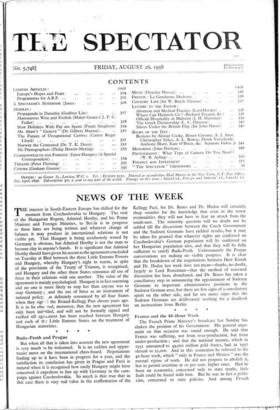Buda-Pesth and Prague But when all that is taken into
account the new agreement is very much to be welcomed. It is no sudden and oppor- tunist move on the international chess-board. Negotiations leading up to it have been in progress for a year, and the satisfaction its conclusion has given in Prague and Paris is natural when it is recognised how easily Hungary might have conceived it expedient to line up with Germany in the cam- paign against Czechoslovakia. So much is that true that in this case there is very real value in the reaffirmation of the Kellogg Pact, for Dr. Benes and Dr. Hodza will certainly sleep sounder for the knowledge that even in the worst eventualities they will not have to fear an attack from the south-east. The minority question will no doubt not be settled till the discussions between the Czech Government and the Sudeten Germans have yielded results, but it may be taken for granted that whatever rights are conferred on Czechoslovakia's German population will be conferred on her Hungarian population also, and that they will be fully sufficient to satisfy Buda-Pesth. Unfortunately the Prague conversations are making no visible progress. It is clear that the breakdown of the negotiations between Herr Kundt and Dr. Hodza last week does not mean—thanks, no doubt, largely to Lord Runciman—that the method of reasoned discussion has been abandoned, and Dr. Benes has taken a conciliatory step in announcing the appointment of Sudeten Germans to important administrative positions in the Sudeten German area, but there are few signs of a conciliatory spirit on the other side, and far too many signs that the Sudeten Germans are deliberately working for a deadlock on instructions from Berlin.
* * * *


































